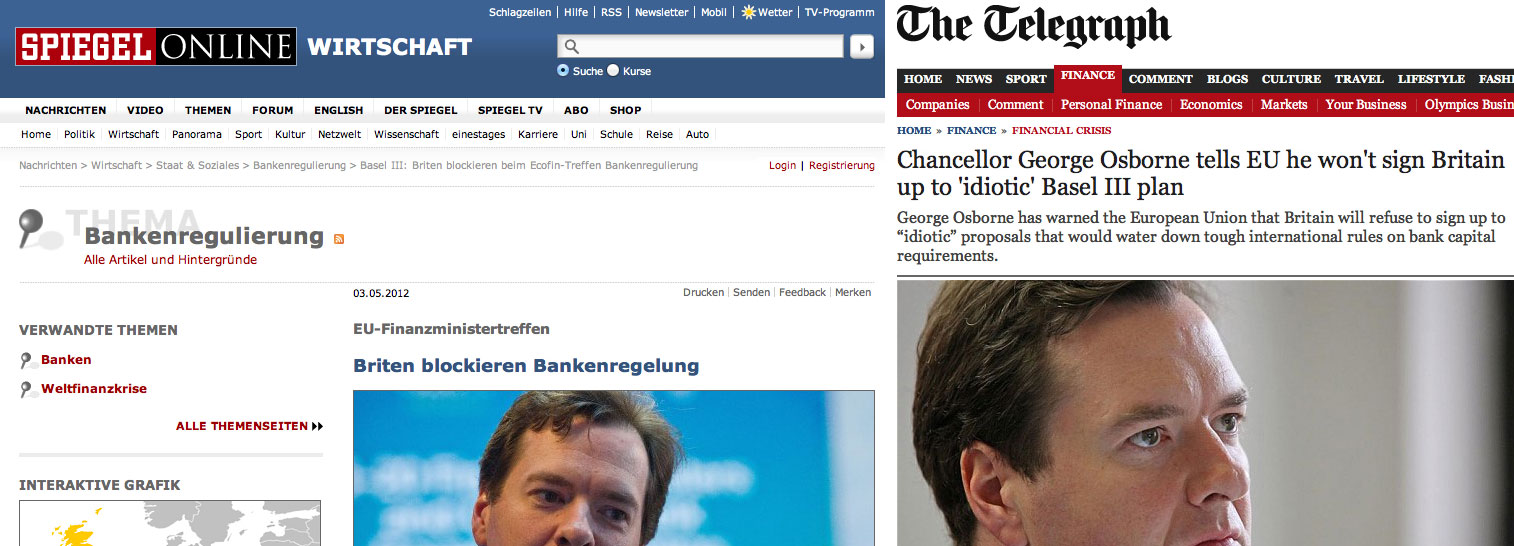What happened at last night’s Ecofin? A lesson for today’s re-publica debate

I’m at re-publica in Berlin, appearing at 1315 on a panel about the European public sphere online. You can follow the panel here (Stage 5).
This morning we started debating these issues with a speech from Euroblogger Ronny Patz, whose ideas are summarized (in German) on Spiegel Online. Ron’s approach is similar to my own, namely that blogs about the EU are rather few and the EU blogosphere helps to slightly enlarge the Brussels bubble, but doesn’t take EU matters to a wider audience. Why, asks Ron, are the EU bloggers sleeping through the Euro-crisis?
News in the mainstream media this morning helps explain it.
I saw tweets like this from Bruno Waterfield, the Daily Telegraph’s Brussels correspondent, last night about a tetchy Ecofin Council where Osborne refused to agree to Basel-III banking reforms at EU level. The problem is: what actually happened?
Take a look at the news stories about the Council from the Daily Telegraph and Spiegel. Can you actually tell from either why the discussions failed and why – substantively – the UK argued the agreement was not tough enough? OK, we know Osborne was angry (seems at least as much to do with missing a dinner in London than anything else? But he has form on being an arrogant sod in Ecofin), but what solution – if any – did he propose? And if the UK opposes weaker rules, what would the consequence be of the UK sticking with tougher rules while the rest do not? We just do not know. We have a partial picture of what happened, and there is very little bloggers can do to fill in the blanks – we don’t have the resources to be there.
This summit was an EU issue covered through partial, national lenses by the mainstream media. Therein is the lack of a European public sphere, even when it’s an EU issue at stake.
Henning – That is a fair point. Part of it is uh, “euroblogging” as defined by self-styled clique of eurobloggers (of which I am part of) which consciously or not excludes more establishment blogs which certainly HAVE blogged about the crisis (WSJ/Economist/FT Brusses blogs, Jean Quatremer..).
so what is the difference between a multi-author blog and an online magazine? The borders become increasingly blurred…
I think it depends on your definition of a blog… While I appreciate Social Europe Journal, and while it has a section called ‘Blogs’, for me it’s much more of an online magazine…
Why do people always want to generalise something to the point it becomes pure nonsense? “Europeans can’t blog” or “Eurobloggers are sleeping through the crisis” are such examples. Social Europe Journal has been criticized for focusing way to much on the Eurozone crisis (new posts every single day)! It is surely not the case that all “blogs” are sleeping through the crisis. Tssss….
“Why, asks Ron, are the EU bloggers sleeping through the Euro-crisis?” What answers did he have?
I’m guessing it’s also a matter of expertise. Very few of us, I would wager, had enough knowledge of economics to confidently expound on the issues posed by the eurozone. In addition, for any kind of multinational political story, we have necessary limits: It isn’t humanly possible to know the national politics of each country so we end up being reduced to providing only partial accounts for why things happen and why negotiations end up the way they do.